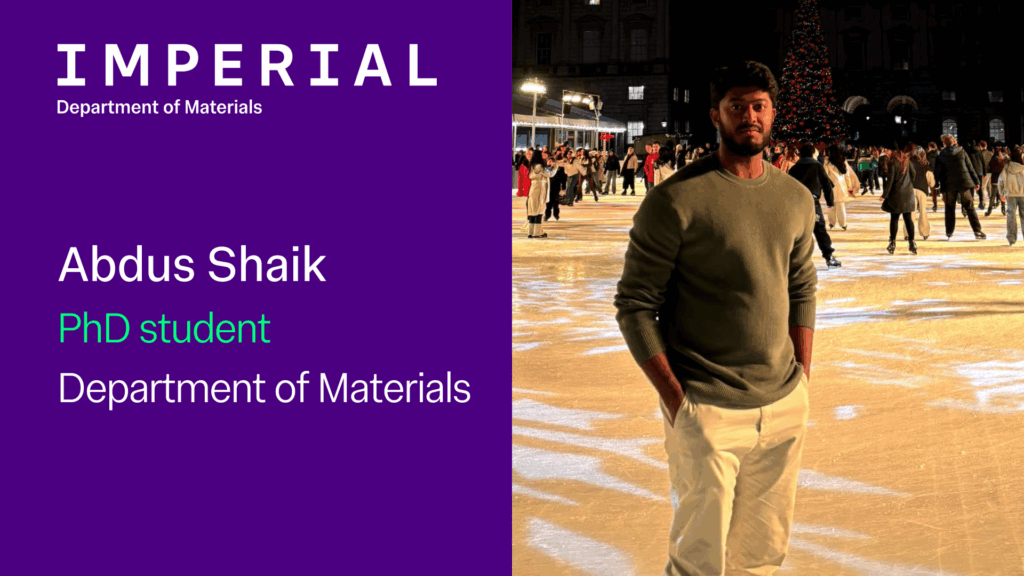
Abdus Shaik is a first year PhD student in the Department of Materials. His research investigates cool fusion reactors, attempting to use computational simulations to understand how the fast neutrons in the reactor interact with the walls of the reactor, and how that is affected by the high temperatures that fusion involves. Being able to build long lasting steels would help to build more cost efficient reactors that will bring us a step closer to near-limitless clean energy.
What inspired you to study for a PhD?
I always told myself I wanted to solve problems, and I’m particularly interested in the energy crisis. But then I asked myself, what can I do to make a difference? Because I have no experience in solving global issues. I chose to find somewhere which can guide me, allow me to be independent and think outside the box, answer questions that actually matter. And the answer to the initial question was: do a PhD in Materials Science at Imperial College London. So here I am!
How would you explain your research to someone outside the field?
My research focuses on the cool fusion reactors (yes the one’s you may have read about in the news!). I use computational simulations to understand how the fast neutrons in the reactor interact with the walls of the reactor, and how that is affected by the high temperatures that fusion involves. While the plasma (really hot gas made up of charged particles) itself reaches around 150 million C, we only deal with temperatures around 500 C, thanks to the strong superconducting magnets. This work helps us predict how materials will behave and degrade over time, which is a crucial step in developing reactors that are long-lasting, safe, sustainable and cost efficient.
Why did you study this area and why is it important?
Climate Change! I did an internship I wasn’t sure I’d enjoy, but I wanted to make good use of my summer. It actually led me to realise what I wanted to do with my life! In particular I wanted to learn more about near-limitless clean energy, and I knew this could help tackle climate change. I also wanted to be able to tell my great grandchildren that I was part of the Fusion Revolution!
How could this research make an impact?
My research is part of NEURONE (Neutron Irradiation of Advanced Steels), a UK Atomic Energy Authority (UKAEA) project working on futuristic steel that can be used in STEP, the UK’s programme to build the first commercialised fusion plant in the world. This research will give scientists and engineers who are part of the wider NEURONE team, a better understanding of how the radiation inside the reactor will speed up the stress induced damage of the steels. Being able to build long lasting steels, would help us build more cost efficient reactors that will bring us a step closer to near-limitless clean energy!
 What do you enjoy most about what you do?
What do you enjoy most about what you do?
Apart from the fact that you can just click a button and a computer does everything for you for 20 hours, I enjoy how I’m constantly learning something new every single day. Sometimes you find out something that would most likely make you the only person in the entire world who knows that. The ability to stare at a box of atoms and admire how things are held together with forces that you can’t see but you can study, and how those forces keep everything together in the entire world, including you and me.
Can you tell us more about the Nuclear Diplomacy Forum which you are working to create at Imperial?
The idea behind the Nuclear Diplomacy Forum, is to build a group of scientists, who would be able to explain anything they do, to absolutely anyone. And to use these communication skills to build diplomacy. Our goal is to use Imperial as a hub for discussions around nuclear energy, emerging technologies, and how that affects local policy and international diplomacy. We are looking to do embassy visits, events in parliament, and hold talks and conferences at Imperial, on the latest developments in the world of nuclear. We are also looking to start a newsletter where people from across the globe can contribute with comment pieces on different developments! If you’d like to sign up to the newsletter, please complete this form. We want this to be able to inspire people to start their own forums to revive the idea of science diplomacy, where science is used to build diplomacy and peace, and diplomacy in return helps advance scientific research.
What’s something your colleagues would be surprised to learn about you?
I speak seven languages and can read and write in four different scripts. I started my BSc in Physics at 16 and graduated by 19.
